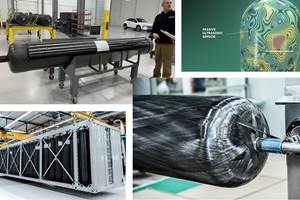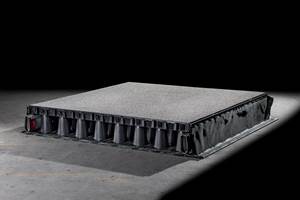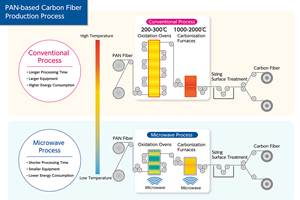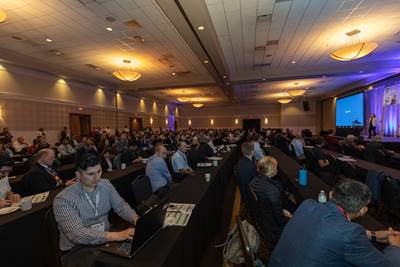Keynote selected for SPE Automotive Composites Conference and Exhibition 2020 virtual event
SPE ACCE, the virtual-only event occurring Sept. 9-11, 2020, announces Jose Chirino of Lanxess Corp. as its first keynote speaker.

SPE ACCE conference 2018. Source | CW
The executive planning committee for the SPE Automotive Composites Conference and Expo (ACCE) announced on July 23 the first keynote speaker for their ACCE 2020, a virtual event jointly produced by The Automotive and Composites Divisions of the Society of Plastics Engineers (SPE, Detroit, Mich., U.S.) and set for Sept. 9-11, 2020. Jose Chirino, American Chemistry Council automotive team chair and technical director for the High Performance Materials (HPM) business unit at Lanxess Corp. (Cologne, Germany) will present “Automotive Plastics and Polymer Composites: A Roadmap for Future Mobility.” The presentation will outline the American Chemistry Council’s new roadmap (see “Automotive roadmap outlines steps for future mobility solutions”) to help automakers and their suppliers invent mobility solutions that can meet the demands of the revolution underway in personal mobility. The committee says the new roadmap also calls for a series of industry-wide, collaborative activities to capture opportunities in each area of the ACCESS framework — Autonomy, Connectivity, Circularity, Electrification, Shared Mobility and Sustainability. As a result, they say, these pre-competitive, cooperative efforts will help automakers unleash the full potential of the advanced plastics and composites essential to enabling future mobility needs.
“Mobility solutions of the future will be enabled by the unique and flexible characteristics inherent in polymer composites,” says Chirino. “Composites enable safe and seamless integration of sensors, electronics and batteries into vehicles without adding extra weight. Automotive fuel economy is improved and greenhouse gas emissions are reduced with the mass savings enabled by lightweight plastics and polymer composites. They can also enhance interiors with improved wear and tear, antimicrobial surfaces, and enable modular and multi-configurable interior components desired in shared and autonomous vehicles.”
In addition to daily keynote presentations, the three-day virtual ACCE will feature approximately 45 technical presentations, 2-3 panel discussions and more than 50 sponsors presenting advances in materials, processes and equipment for both thermoset and thermoplastic composites in a wide variety of transportation applications. SPE says the daily virtual networking opportunities will enhance the value of the event, which expects to draw more than 400 attendees worldwide.
The technical presentations (20-30 minutes each), are organized in the following categories: Advances in Thermoplastic Composites; Advances in Thermoset Composites; Virtual Prototyping; Testing and Modeling; Reinforcement Technologies; Additive Manufacturing and 3D Printing; Nanocomposites; Enabling Technologies; Sustainable Composites; Bonding; Joining and Finishing; Opportunities and Challenges with Carbon Composites; and Business Trends and Technology Solutions.
“Composites – Driving Innovative Transportation with Electrification, Mobility, Autonomy,” is the theme for this year’s event, reflecting the industry advancing with new technologies and polymer composites solutions. The 2020 ACCE is co-chaired by Dr. Alper Kiziltas, technical expert for Ford Motor Co. (Dearborn, Mich., U.S.) and SPE Automotive Division Chair, and Dr. Xiaosong Huang, lab group manager of Polymer Composites Systems for global research and development department at General Motors Co. (Detroit, Mich., U.S.). The technical program is co-chaired by Dr. David Jack, associate professor of mechanical engineering at Baylor University (Waco, Texas, U.S.), Dr. Leonardo Simon, professor of chemical engineering at Waterloo University (Waterloo, Ontario, Canada) and Dr. Oleksandr G. Kravchenko, assistant professor of composites modeling and manufacturing group in the department of mechanical and aerospace engineering at Old Dominion University (Norfolk, Verm., U.S.).
Related Content
Hexagon Purus Westminster: Experience, growth, new developments in hydrogen storage
Hexagon Purus scales production of Type 4 composite tanks, discusses growth, recyclability, sensors and carbon fiber supply and sustainability.
Read MoreCirculinQ: Glass fiber, recycled plastic turn paving into climate solutions
Durable, modular paving system from recycled composite filters, collects, infiltrates stormwater to reduce flooding and recharge local aquifers.
Read MoreRecycling end-of-life composite parts: New methods, markets
From infrastructure solutions to consumer products, Polish recycler Anmet and Netherlands-based researchers are developing new methods for repurposing wind turbine blades and other composite parts.
Read MoreMicrowave heating for more sustainable carbon fiber
Skeptics say it won’t work — Osaka-based Microwave Chemical Co. says it already has — and continues to advance its simulation-based technology to slash energy use and emissions in manufacturing.
Read MoreRead Next
SPE Automotive Composites Conference and Exhibition 2020 transitions into virtual event
The virtual ACCE will be held Sept. 9-11, 2020 — the dates it was originally planned for — and will include technical sessions, sponsorship and exhibit options and online networking opportunities.
Read MoreModeling and characterization of crushable composite structures
How the predictive tool “CZone” is applied to simulate the axial crushing response of composites, providing valuable insights into their use for motorsport applications.
Read More“Structured air” TPS safeguards composite structures
Powered by an 85% air/15% pure polyimide aerogel, Blueshift’s novel material system protects structures during transient thermal events from -200°C to beyond 2400°C for rockets, battery boxes and more.
Read More












.jpg;maxWidth=300;quality=90)













